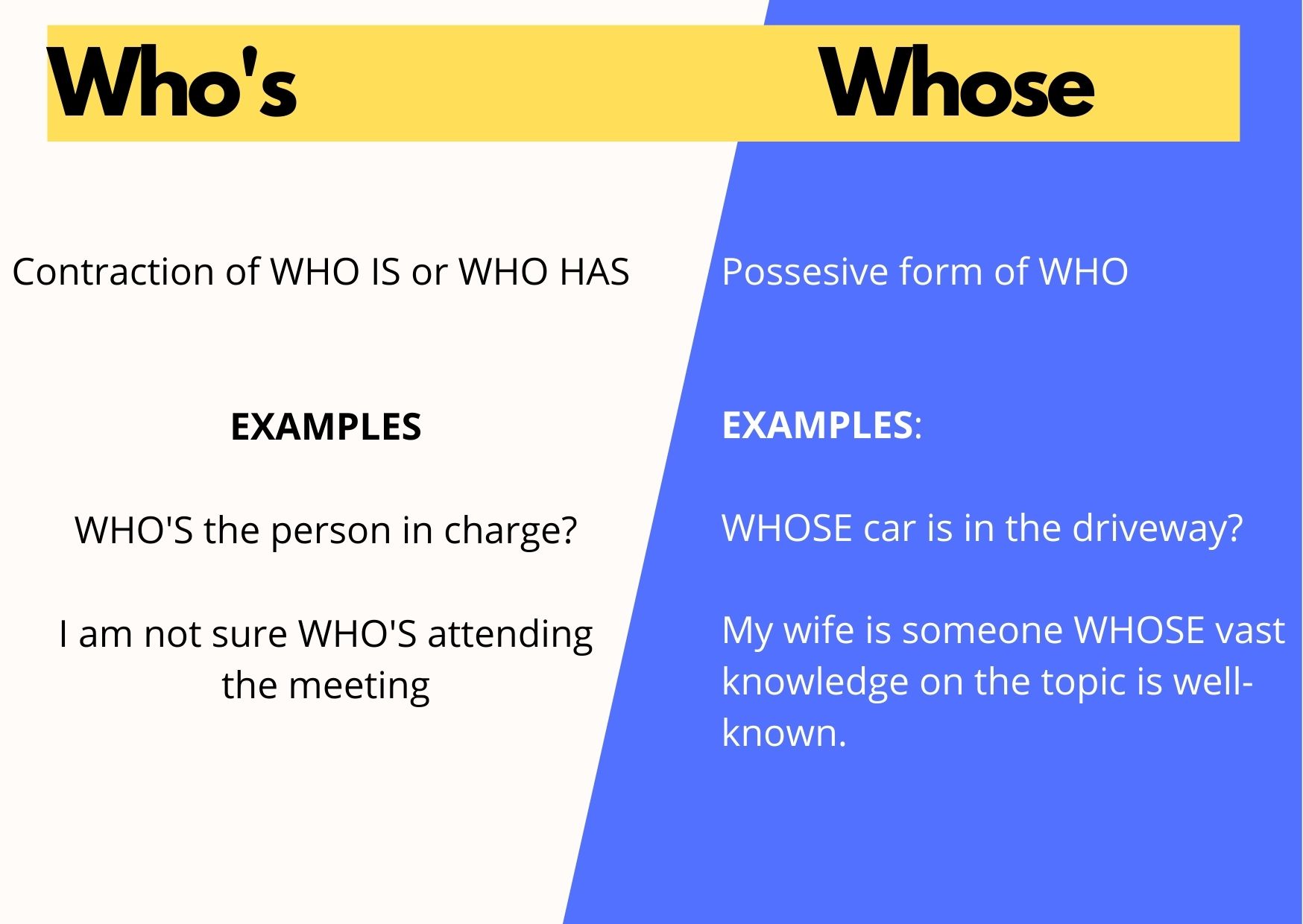The words who’s and whose may sound the same, but knowing when to use each one correctly can be challenging. Who’s is a contraction that combines the words who is or who has. Meanwhile, whose is the possessive form of who. For an in-depth explanation of the difference, read on.
Who’s vs. Whose
- The words who’s and whose both come from the pronoun who.
- Who’s is a contraction, or a shortened and combined version of two words (who + is, or who + has). For example: Who’s ready for dinner?
- Whose is not a contraction; it’s a possessive pronoun. It should be used to ask or tell to whom something belongs. For example: Whose lunchbox is this?
When the word “whom” is needed to explain what “whose” means, you generally need more information. Although who’s is a contraction and whose is possessive, putting them together can make you sound a bit like an owl. This is because the two words are homophones: words that sound exactly the same but have different meanings. Learn more about when to which one below.
First, we’ll address the tricky pronoun who. As you may already know, it has multiple forms and is prone to incorrect usage.
Who
Like he, she, I, and they, who is a subject pronoun. It is the interrogative that is used for animate subjects. In simpler terms, who is used to ask which person is someone or which person did something.
- Who asked you to go to the party?
- Who is in charge?
- Who is that over there?
Whom
Many English speakers consider the word whom to be the bane of their existence. But in reality, it’s not as confusing as you might think. Whom is an object pronoun. This means that if you can replace it with the words him, her, me, or them, it’s being used correctly.
- To whom are you speaking? (I’m speaking to them.)
- Whom did you invite to go to the wedding with you? (I invited her to go to the wedding.)
- Whom are you making a reference to? (I’m making a reference to him.)
We’ll admit, whom can definitely sound stuffy, but if you want to use it correctly, just know that it should be used as an object pronoun.
Related: For more information, you can read this article discussing who vs. whom.
Who’s or Whose
These two words sound exactly the same: hoos, which rhymes with shoes. But is it whose shoes or who’s shoes?
Who’s
Remember: Who is the pronoun that means “what or which person or people.” You can add the apostrophe + s in the following cases:
- Who’s = who + is
- Who’s = who + has
The use of who’s is actually pretty simple! It’s a contraction, and as you probably know, the apostrophe takes the place of the missing letters, making pronunciation simpler and quicker. Think about the sentence, “I do not know who is going to go.” In regular speech, this is often said as, “I don’t know who’s gonna go.” While gonna may not be considered acceptable, the contraction who’s is widely accepted.
Whose
When we say, “Whose shoes,” what does that actually mean? It translates to, “To whom do the shoes belong?”
Whose is a pronoun that’s used in questions. Its function is to ask who has or owns something. Put simply, whose indicates possession.
A common mistake is thinking that who’s, rather than whose, is the possessive form of who. This is because possessive nouns use the same pattern, with an apostrophe and the letter s. However, note that apostrophes are also used in contractions, and that’s what’s happening with the word who’s.
Think of it like this:
- Its means belonging to it.
- It’s is a contraction made up of it + is or it + has.
- Whose means belonging to whom.
- Who’s is a contraction made up of who + is or who + has.
Therefore, if you said, “Who’s shoes?” you would really be saying, “Who is shoes?” As you can see, this doesn’t make much sense! Alternatively, “Who’s shoes,” could mean “Who has shoes?” However, this isn’t the way we typically phrase this type of question. It’s more likely we’d say, “Who’s got shoes (Who has got shoes)?”

Who’s Got Time for Examples?
We hope you have the time! So, whose time is it? It’s your time. And if you struggle with the difference between these two words, we hope you’ll check out these examples them in context.
- Who’s afraid of monsters?
- Whose line is it anyway?
- The Team Behind the Scenes: A Who’s Who of the Crew
- Their roles were filled by FBI agents whose identities remain unknown.
- Sally carried a flashlight, whose light reflected in the puddles from the recent rain. (In this example, whose might sound a bit strange. Generally, it’s used to refer to animate beings rather than inanimate objects like flashlights, but the alternative is to say, “Sally carried a flashlight, the light of which reflected in the puddles from the recent rain.” Both options are grammatically correct, but whose reads less awkwardly.)
- They’re great friends who’ve shown their loyalty time and again. (Who’ve, similar to who’s, is a contraction. It’s made up of who + have.)
Who’s Clear on Who’s and Whose?
Hopefully, anyone who has read this far into the article has gotten a good grasp on who’s vs. whose! Here’s a quick recap:
- Both who’s and whose are versions of who, which is an interrogative pronoun.
- Who’s is a contraction made up of the words who + is or who + has.
- Whose means “of which” or “belonging to whom.”
To test your newfound knowledge, here is a quick, fun quiz.
—
Want to sharpen your business writing skills? Discover our acclaimed online courses at syntaxtraining.com






